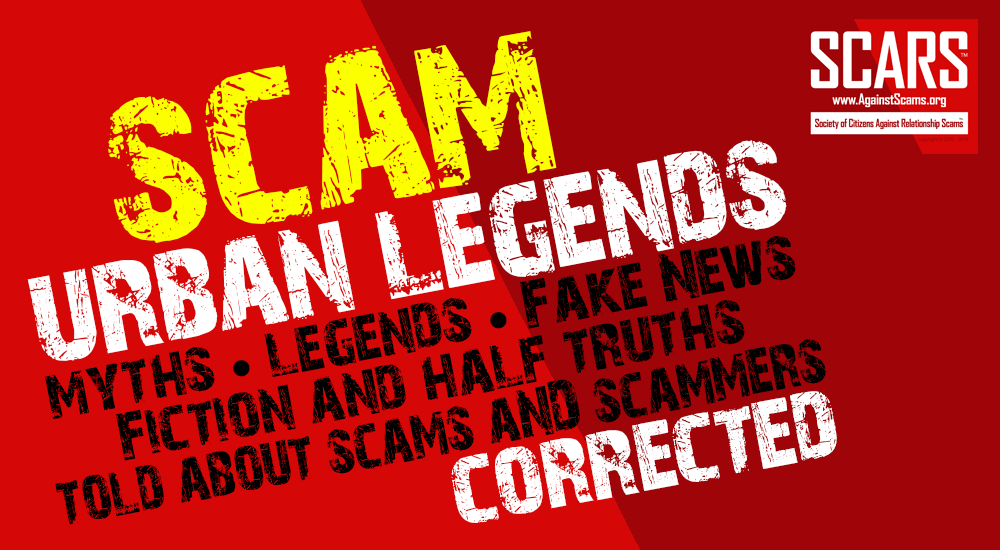SCARS™ Urban Legends: Do Something Useful With Their Lives!
We hear it almost every day. A victim will comment as though asking a scammer “Why don’t you do something useful for others?”
This is not going to be a popular view since most victims want to vilify scammers as being evil, lazy, or worthless. But the truth is far different.
The truth is the most scammers are running a business, and like all businesses, it has its complexity, ups and downs, and risks that need to be managed. It just turns out that this business is a criminal one.
Remember…
Our job is not to feed hate and prejudice. Our job is to tell you the truth so you can accept what happened to you and heal from it. Some of these truths are going to be hard to hear!
Like a business, Scamming benefits its owners, employees, and its community!
We have previously spoken about how scamming is big business. One recent arrest of someone named “Hushpuppy” stopped billions in online fraud. But it is more than that, scammers are viewed by many in their countries as heroes.
I countries like Ghana, where law enforcement does very little about scammers or fraudsters they are viewed as employers and supporters of their communities. Scamming brings in so much money that it is a significant part of their national GDP. In most cases, one of the reasons why outside influence has been limited is that scammers bring in more than the foreign aid from countries like the United States.
The fact that this is a crime is not the principal issue to the people in these countries that depend on scammers for their income. Thus for large parts of the population of some countries scammers represent pivotal industrialists supporting local economies – to them, they are no different than Bill Gates or Mark Zuckerberg.
This view of gangsters as benefactors is not new. In the United States during the Great Depression Al Capone supported his community with jobs and philanthropy as well (see Al Capone Ran A Soup Kitchen.) In today’s Ghana, scammers are virtually running and funding several of their universities – teaching the youth of Ghana technology skills – of course, these are mostly applied to produce more scammers, but not always. Additionally, after scammers make their money, they frequently apply it to the founding of new legitimate businesses. Scammers are today’s “Robber Barons” fueling the economies of their future (from the misery of victims today.)
The point of this article is to establish that scammers, while they are criminals in nature, they are far from lazy, do nothing useless people.
We are NOT taking their side – they are criminals that do vast harm to millions of people.
But it is important to understand that many of them (not all) apply their skills in the development of more than just filling their pockets. The ones that are frequently seen showing their stolen money are just low-level thugs, but the majority of scammers stay hidden working their illegal businesses without showing off. This is one of the reasons why it has been hard to attack the larger cartels, because they are both supporters of their local communities and because they remain very hidden. This is true of scammers in Africa, Russia, China, India, Latin America, and elsewhere.
It is most important that victims stop mythologizing scammers because by the insulting of scammers it only diminishes the victims.
If scammers are so stupid and lazy and do nothing useful then how did they scam so many smart useful people around the world?
It must mean that all victims are stupid and lazy themselves to be conned by such people!
Of course, we know that is NOT true. Scammers are smart and capable – that is how they scam smart people.
It is actually harder to accept that you were scammed from a stupid person than to admit that the scammer was an expert in what they do. No one likes to be beaten by an incompetent opponent, yet scam victims trapped in their anger insist on this which only makes it harder to accept and ultimately recover from.
So, the next time you hear to see someone call scammers stupid remind them that scammers are expert professionals at what they do! That when they insult scammers they are only insulting their victims!
Learn More:
Here is a Nigerian’s View: http://saharareporters.com/2020/06/27/why-hushpuppi-won%E2%80%99t-be-last-nigerian-fraudster-samuel-osho
TAGS: SCARS, Information About Scams, Anti-Scam, Scams, Scammers, Fraudsters, Cybercrime, Crybercriminals, Scam Victims, Smart Scammers, Scammers Are Lazy, Scammers Are Stupid, Insulting Scammers, Insulting Victims, Scammers Are Dumb, Urban Legends, Half Truths, Fake News
SCARS™ Team
Society of Citizens Against Relationship Scams Inc.
A Worldwide Crime Victims Assistance Nonprofit Organization
Visit: www.AgainstScams.org
Contact Us: Contact@AgainstScams.org
PLEASE SHARE OUR ARTICLES WITH YOUR FRIENDS & FAMILY
HELP OTHERS STAY SAFE ONLINE – YOUR KNOWLEDGE CAN MAKE THE DIFFERENCE!
The Latest SCARS Posts:
FIND MORE SCAM NEWS
«SCAMCRIME.COM»
JOIN US ON FACEBOOK
«CLICK HERE»
END
MORE INFORMATION
– – –
Tell us about your experiences with Romance Scammers in our
« Scams Discussion Forum on Facebook »
– – –
FAQ: How Do You Properly Report Scammers?
It is essential that law enforcement knows about scams & scammers, even though there is nothing (in most cases) that they can do.
Always report scams involving money lost or where you received money to:
- Local Police – ask them to take an “informational” police report – say you need it for your insurance
- U.S. State Police (if you live in the U.S.) – they will take the matter more seriously and provide you with more help than local police
- Your National Police or FBI « www.IC3.gov »
- The SCARS|CDN™ Cybercriminal Data Network – Worldwide Reporting Network on « www.Anyscam.com »
This helps your government understand the problem, and allows law enforcement to add scammers on watch lists worldwide.
– – –
To learn more about SCARS visit « www.AgainstScams.org »
Please be sure to report all scammers
on « www.Anyscam.com »
Disclaimer:
SCARS IS A DIGITAL PUBLISHER AND DOES NOT OFFER HEALTH OR MEDICAL ADVICE, LEGAL ADVICE, FINANCIAL ADVICE, OR SERVICES THAT SCARS IS NOT LICENSED OR REGISTERED TO PERFORM.
IF YOU’RE FACING A MEDICAL EMERGENCY, CALL YOUR LOCAL EMERGENCY SERVICES IMMEDIATELY, OR VISIT THE NEAREST EMERGENCY ROOM OR URGENT CARE CENTER. YOU SHOULD CONSULT YOUR HEALTHCARE PROVIDER BEFORE FOLLOWING ANY MEDICALLY RELATED INFORMATION PRESENTED ON OUR PAGES.
ALWAYS CONSULT A LICENSED ATTORNEY FOR ANY ADVICE REGARDING LEGAL MATTERS.
A LICENSED FINANCIAL OR TAX PROFESSIONAL SHOULD BE CONSULTED BEFORE ACTING ON ANY INFORMATION RELATING TO YOUR PERSONAL FINANCES OR TAX RELATED ISSUES AND INFORMATION.
This content and other material contained on the website, apps, newsletter, and products (“Content”), is general in nature and for informational purposes only and does not constitute medical, legal, or financial advice; the Content is not intended to be a substitute for licensed or regulated professional advice. Always consult your doctor or other qualified healthcare provider, lawyer, financial, or tax professional with any questions you may have regarding the educational information contained herein. SCARS makes no guarantees about the efficacy of information described on or in SCARS’ Content. The information contained is subject to change and is not intended to cover all possible situations or effects. SCARS does not recommend or endorse any specific professional or care provider, product, service, or other information that may be mentioned in SCARS’ websites, apps, and Content unless explicitly identified as such.
The disclaimers herein are provided on this page for ease of reference. These disclaimers supplement and are a part of SCARS’ website’s Terms of Use.
Legal Notices:
All original content is Copyright © 1991 – 2020 Society of Citizens Against Relationship Scams Inc. (D.B.A SCARS) All Rights Reserved Worldwide & Webwide. Third-party copyrights acknowledge.
SCARS, SCARS|INTERNATIONAL, SCARS, SCARS|SUPPORT, SCARS, RSN, Romance Scams Now, SCARS|INTERNATION, SCARS|WORLDWIDE, SCARS|GLOBAL, SCARS, Society of Citizens Against Relationship Scams, Society of Citizens Against Romance Scams, SCARS|ANYSCAM, Project Anyscam, Anyscam, SCARS|GOFCH, GOFCH, SCARS|CHINA, SCARS|CDN, SCARS|UK, SCARS|LATINOAMERICA, SCARS|MEMBER, SCARS|VOLUNTEER, SCARS Cybercriminal Data Network, Cobalt Alert, Scam Victims Support Group, are all trademarks of Society of Citizens Against Relationship Scams Inc., All Rights Reserved Worldwide
Contact the law firm for the Society of Citizens Against Relationship Scams Incorporated by email at legal@AgainstScams.org











Leave A Comment